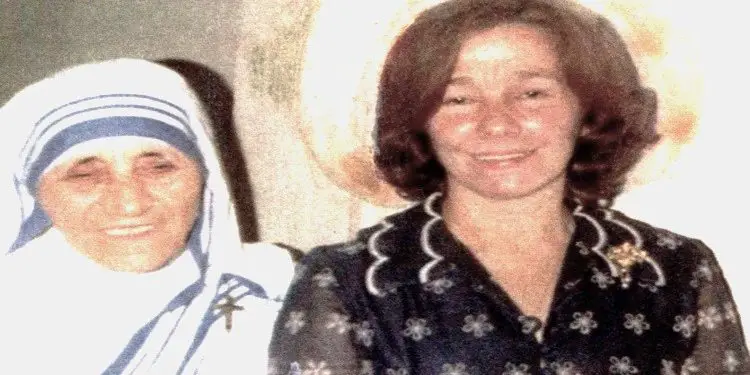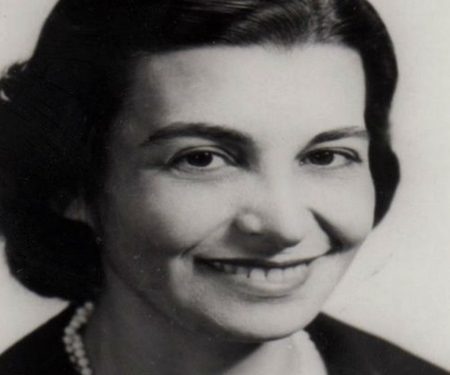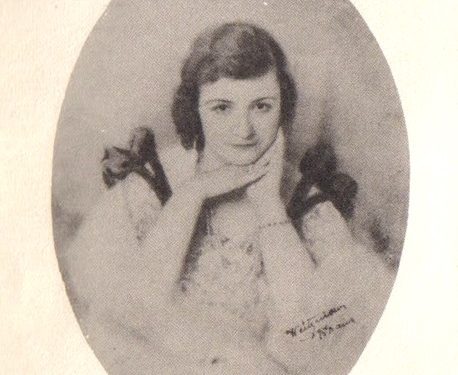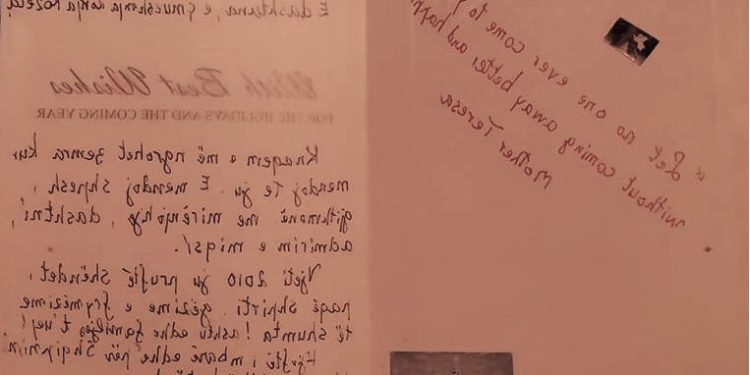By Keze Kozeta Zylo
Memorie.al / Mrs. Lume Juka are an intellectual of the Diaspora, she worked as a French professor her entire life, but even though she was forced to leave her Motherland at a young age, she never forgot the land of her ancestors, her birthplace, the beautiful Shkodërloca. It is in our honor as Albanians, that we have among us these bright figures who have worked so hard for the Nation, it is in our honor not to remain silent…! From the telephone conversation I had with this lady, she radiated kindness, almost divine, unusual simplicity; she never wanted to talk about herself, but only about the love of her sister, Professor Safete Juka, her family, as well as our long-suffering Motherland.
I supported the idea that Professor Safete Juka be declared “Honor of the Nation”, but so far it has fallen on deaf ears. I would like to take this opportunity to thank Mr. Eduard Dilo, a close friend of the Juka family, as well as the sucker of the maternal and persecuted Dilo family, for decades, which made this conversation so warm and very human.
Mrs. Juka, what a beautiful voice you sound like on the phone, as if you were a young girl?
I am a young girl, (laughs), my soul never ages! When I was little, I always heard the greeting for the elderly: “Grow old”! On the other hand, I said to myself: “Why do they remember old age so much”? In fact, the elderly were much respected back then; they would come to the corner, at the top of the chimney and listen to their wise words!
When did you leave Albania?
I left at the age of 11 and we settled in Egypt with my family. Egypt was the center of opponents of communist politics. There we met Ali Kërcyrë, Koco Muka, etc.… they joined together. My father passed away in Alexandria.
You are the daughter of Musa Juka, a former minister during Zog’s time, what do you remember about your father?
My father led three ministries, the Ministry of Foreign Affairs, the Ministry of Economy and the Ministry of the Interior.
Is it a rare case to oversee three ministries?
Yes, this is true; he led them with professionalism and culture for that time. He was educated in Istanbul. My parents come from wealthy families, from Shkodra, but I often heard them say that they were ashamed to be rich in that poor country. The house was open to the poor; we did not have a maid. Our house burned down two or three times. I remember once, my little brother had come home from school and was shivering with cold.
Mom asked him where he had the jacket he had worn in the morning? He replied that he had given it to a friend who was colder than him. When my father gave him some money, he always saved it and went with his friends to the cinema. Kindness was a distinctive feature of my parents. My father was a silent man. Even in prison, when my father talked to different people, he would tell them that we all strive for our Nation, but in different ways. My parents admired Faik Konica a lot; they appreciated his wisdom and diplomacy.
You speak a pure language, how is it possible that you have kept it so pure like the snow of the White Mountains?
My pure language is the merit of my parents. Even when we could not find a word, they would tell us to find the Albanian word, never replace it with a foreign word. We only spoke Albanian at home; they didn’t allow us to speak another language. They were very concerned that we would never forget our language.
When did you first go to Albania?
I went to Albania for the first time in 1995 and stayed with the Petrela family in Tirana. They had four good sons; they worked hard and gave all their money to their father. For this I valued them very much, the Albanian family was sacred and we must protect it like the apple of our eye. There I saw up close this tradition of the Albanian family, the mutual respect that we should have for parents and children.
The reason I insisted several times to interview you was that I recently read in some newspapers the bequest of your sister, Professor Safete Juka. She had donated a sum of 40 thousand dollars, to be put at the service of the National Library. What more can you tell us about this noble and humane gesture? Meanwhile, you sent a letter to the director of the National Library, Mr. Plasari, where you explained it in more detail.
I was very emotional; I did not expect that such a simple letter would have so much emotion, so many readers. My sister did this act silently. The American Bank informed me that she had deposited 40 thousand dollars for the National Library.
I have often read about Prof. Safete Juka, I have supported the idea that she be declared “Honor of the Nation”…!
I have wanted to thank you with all my heart, that you appreciate beauty, intellectualism and everything. I thank you as a family for the Albanian school and for the opening of Television. When I read your article about Diloyada, tears flowed without stopping, I cried. I knew that persecuted family closely. My sister had Kosovo in her heart. She didn’t miss a demonstration without going to Kosovo, in the rain and in the snow. She didn’t go to the podiums, but you know what she did?
She lived among the people and when foreigners passed by, she always spoke to them about Kosovo, about the Serbian genocide, about the suffering people of Kosovo. She had a very simple personality, but my conscience always tormented me whether I should have kept her silent, or should I write a letter to the Library about her legacy? I prayed to God for this action.
Kadare praised Prof. Safete Juka as a second Dora D’Istria, did you communicate directly with the great writer?
Kadare pointed this out through Dr. Moikom Zeqo. In 1994, in the Durrës Library, Dr. Zeqo found her book entitled “Kosova”, and was fascinated when he saw her documentation. He wrote an article in the newspaper “Koha Jonë”, about her. He was the first to write about her. I am grateful to Dr. Zeqo. She defended her doctorate in philosophy at the Sorbonne in France in 1969. She organized the scientific conference on Kosovo in New York, and later published the book “Kosova”, where she provides a lot of information about Albanians with historical documents. My sister often wrote in the newspaper “Dielli”. She loved this newspaper and collaborated with this organ of the Hearth.
It was very great when I heard that the newspaper “Dielli” will be reprinted again, once a month and that Dalip Greca will be the editor. I have known Dalip since Albania, I read his writings in the Supplement and they were very interesting. I am very grateful to him for writing the article about my sister and publishing it in the Diaspora newspaper, “Illyria” with the publisher Mr. Vehbi Bajrami. Zenepe Luka also wrote and supports the idea of declaring Prof. Juka “Honor of the Nation”. For me, it doesn’t matter at all if they don’t give it to her; she worked with a lot of heart. Her manuscripts are open. My heart is broken; Safete and my dear brother went to that world early, in the same year.
You are a collaborator of the sisters of Mother Teresa and you have met Mother Teresa several times, what do you remember from your meetings with her?
I told you at the beginning of our conversation, Mrs. Kozeta, that I do not want to talk about myself, I want to talk only about some memories with my sister Safete Juka.
Please, Mrs. Lume, I understand your simplicity, but you should do this only for the readers, since your messages are very human; they are for our common Nation.
OK then, if I do not spoil your mood, I want to talk only about spiritual experience. I have taught French, but there is also a language more beautiful than all the languages of the world, that is the language of the heart, the language of loving one another. When I taught, students would stay in the classroom even after class, especially those who had something to discuss or some ambiguity. After I finished correcting, I would sit down and discuss with them with pleasure. People are often judged by their diplomas, but they should be judged by what they do for others. I always pray to God together with the nuns, I am a collaborator of the “Mother Teresa” sisters.
Are there any other Albanians with you when you pray?
Two Albanians from Kosovo have recently joined us. In 1969, I had a toothache, and I was waiting to go to the dentist. In the waiting room at the dentist’s office, I read the magazine that is no longer published, “Look”, inside it was the article “Imagine a White Star”! I was going through a spiritual crisis, I was idealistic. When I read that the article was about an Albanian, I was extremely excited!
Mother Teresa was very little known in the Diaspora. I took the magazine and with great enthusiasm, I spoke to the students the next day about Mother Teresa. I spoke to everyone about Mother Teresa, her charity and above all that she was an Albanian. I still keep the magazine today; I have it at home, in Tirana. I also saw the film “Some Beautiful Things Have Been Forgotten”, which is dedicated to Mother Teresa. The author was an English writer, journalist and worked in TV.
Here is how the author describes Mother Teresa, when she was invited to his studio: “I see a nun coming, I didn’t know anything about her exactly. I asked her where you have your notes. Teresa replied that the words I have to say, I have from God. She started talking, and what impressed me the most was that she didn’t ask for help, while everyone else asked for help. The program was half an hour, the interview with her was at 3:30 in the morning, and at this hour they don’t watch her much, but what surprised me later was that the help for her didn’t stop.”
From the inspiration that the journalist had for him, he wanted to write a book. So he made the film about Mother Teresa. During the filming, he remembers that when it was time to film, to photograph the children who were half dead on the street, there was no light on the camera. She had told him, don’t worry, he filmed and so without light, it is the light of God inside.
When the author went to England and developed the film, the photographs were more beautiful than all those with light. He was an atheist, but after meeting Mother Teresa and her sisters, he became a Catholic. He felt the power of God who says: “Man, I need you, I need your heart, and with your heart I express my love in this world”…! He has left us free to choose. It was the power of God that took Mother Teresa to India, and to serve the poor. She did something that no one else has done.
The author has pointed out what she did in Calcutta, where people were thrown into the streets half dead, while Mother Teresa took them and put them on her bed. She took them one by one to clean them. She said that she was bringing them a beautiful death. Their smell and the worms that were inside the body meant that none of them had the courage to clean them, only she took them and cleaned them. In the last moments of their lives, they said that we lived like animals, but now we are dying like angels.
How did you meet Mother Teresa?
I am a collaborator, I often go with the Teresa sisters, and they call me Sister Lume. On September 5 of this year, it was the anniversary of her death. I went to mass, I prayed and after the mass was over, they told me that I am part of her…! I knew her very well; I lived in the same house with her, for more than two months here in New York. In 1969, Mother Teresa’s brother came and I met him directly. He was a cultured man. In 1976, Mother Teresa also came and I told my sister to go. When we got there, she took our hands and led us to a small room. She took both of our hands in her lap and we started talking about many things. I saw that there was very little time, but she kept us for three hours.
How did you arrange the meeting with Mother Teresa, Queen Geraldine and Prince Leka?
I organized the meeting with Mother Teresa, Queen Geraldine and Prince Leka together with Sister Andrea. I prayed to God that they would meet. When I called Sister Andreas, that I wanted Mother Teresa to meet with Queen Geraldine and Prince Leka, she told me that Mother Teresa is very busy, and is in prayer day and night. I begged them to do something impossible. I called her again and said: Yes, Mother Teresa, do you eat bread? Yes, – they answered me; we will bring the food on a tray. Then I said to her, – please put a note, that Queen Geraldine wanted to meet her, not as a Queen, but as a believer and put my name on it. They accepted this option that I approached them.
After Mother Teresa had read the note, she had accepted the meeting with us. Sister Andrea called me at 11:30 pm and said that Mother Teresa is expecting you at 6 am. Teresa’s sisters wake up every day at 3:30 am and say their prayers. I happily took Prince Leka to the meeting. I went early and waited in the lobby. There I found Queen Geraldine and she told me that it was the happiest day of her life, that she would meet Mother Teresa. Mother Teresa was waiting for us in the chapel, there a sister as beautiful as spring opened the door for us. We went to a room, the three of us sat down, while she told the Queen that she did not deal with politics, but the Queen replied: – neither did I.
Mother Teresa told her that I have always prayed for you and your family. The Queen replied: “I have always felt that someone was praying to God for me and for my son.” At this time, I slowly, slowly withdrew, and waited for them outside. When they came out, they were both illuminated by a divine light. They both had a great desire to meet each other. Mother Teresa continued the conversation about the Albanian language. She claimed that I wrote to my mother only in Albanian. She called her mother Mother Loke. She also spoke Albanian with her brother. Personally, I have my soul with Mother Teresa.
I don’t know how to stop her. Once they had told us to go to the assembly at six o’clock, that the branch of spiritual prayers would be opened in New York, because she was surprised by the loneliness in which people lived. Mother Teresa had great pain for people, which is why she opened this branch. An Irish writer accompanied her. She said that they had gone together to the Albanian Embassy in Rome, to get a visa, to see her mother, but unfortunately her visa was refused. It was the first time I saw her cry, she continued. I understood that her suffering makes her understand the suffering of others.
Thank you, Mrs. Lume, for this warm conversation, I really admire your simplicity, I had something to learn from you.
I had also really wanted to communicate with you, it was a spiritual conversation. Memorie.al
Staten Island, New York May 10, 2009















